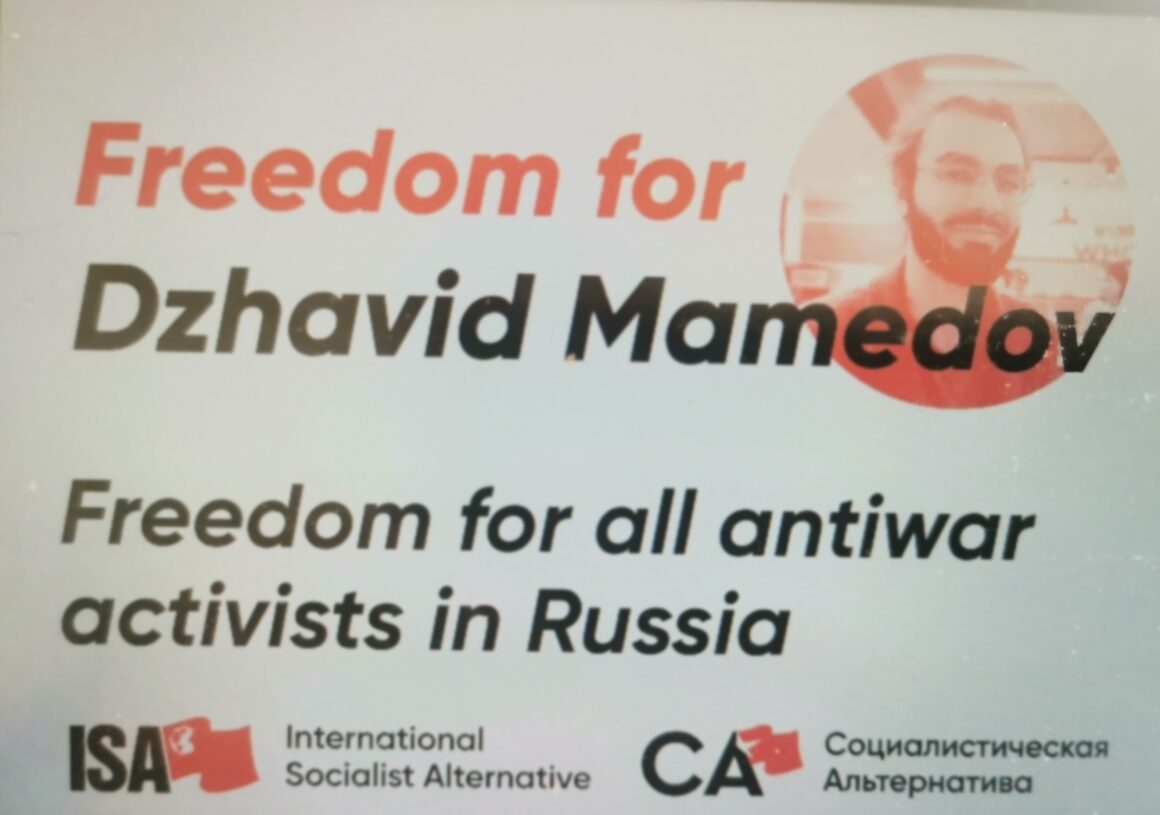20 May: Day of international solidarity with Russian anti-war activists! Freedom for Dzhavid Mamedov and all anti-war activists! For international solidarity of the working class to stop the war!
Tverskoi Court in Moscow has sentenced Dzhavid Mamedov, a socialist, anti-war activist, campaigner for women’s and LGBTQ+ rights, student trade union organiser, and participant in the resistance to the Lukashenko regime in Belarus, and the Putin regime in Russia. to another 30 days in prison. He had only just been released from prison after spending the previous month locked up.
The Russian regime is showing increasing signs of desperation at its lack of success in its “special military operation” aimed at the “denazification” of Ukraine.
Right from the start, tens of thousands of Russians have resisted and bravely spoken out against the war and regime, at serious risk of political persecution and arrest. During this time, more than 15,000 people have been detained, many facing police violence, torture, and lengthy imprisonment. For now, repression has succeeded in preventing organized opposition to the war, but this does not mean that it doesn’t exist.
Discontent within the ruling elite is reflected by individualistic acts such as the flight abroad of leading figures from the entertainment world, or a number of top-level suicides and resignations from company boards. These people only think only of themselves, saving their own careers and wealth. Such actions are accompanied by reports of the arrest of leading military and intelligence figures.
At the same time, ordinary working people who are suffering directly from the war, in the absence of organised opposition are desperately doing whatever they can. Parents of young sailors apparently killed when the cruiser “Moskva” sank are joined by those whose sons have ‘disappeared’ in Ukraine and are frantically searching for news. There are many reports of soldiers who either disobey demands in Ukraine, or who refuse to be sent there in the first place.
Sometimes even more desperate actions are taken. A number of army recruitment offices have been attacked with Molotov cocktails. A wave of fires has destroyed oil and weapon storages in Russia itself, not just on the border with Ukraine. Last week an explosives factory in the Urals burnt, whilst a huge warehouse storing school textbooks in Tver, a city 100 km north of Moscow was destroyed, just after the publisher announced it was removing any mention of Ukraine from history textbooks.
But these are individual acts, in themselves incapable of stopping the war. They are ignored in the media, and even mentioning them opens people up to prosecution. This is why the regime is so determined to take action to prevent any resurgence of the heroic anti-war protests that swept Russia in the early days. Opinion polls and anecdotal evidence show that anti-war sentiment is getting stronger amongst the youth and the working class.
The danger now is that the youthful protests could link up in an organised way with a wider protest by the working class, which is suffering from lay-offs, factory closures and rocketing inflation. There has been a small but significant number of strikes.
The benefit of collective, organised action was seen in St Petersburg, where the Rector of St Petersburg University announced that 40 students, including supporters of Sotsialisticheskaya Alternativa, would be expelled. When the students organised, and a day of solidarity action held, the Rector was forced to withdraw the threat.
It is for this reason that the regime is prepared to go to any length to prevent organised opposition.
Dzhavid has been a victim of their arbitrary action. In early April, he was sent to prison for 30 days for reposting a call to oppose the war on social media. A week before the end of his sentence, strange things started to happen. He found himself with a new cell-mate. It turned out that this individual had been arrested on 25 March with a great media fanfare accusing him of being a Ukrainian spy. They called him a dangerous criminal who, the media reported, had confessed to spying for both Ukraine and Poland. The fact that he suddenly turned up in Dzhavid’s cell in a prison for non-criminal offenders indicated he was now working with the security services. He openly threatened Dzhavid that unless he left the country by 2 May, he would face criminal charges of “extremist activities”. Having failed to convince him of this, he then suggested Dzhavid should smuggle alcohol into the prison, undoubtedly hoping to convince him to cooperate while under the influence.
In consultation with other supporters, Dzhavid had already decided to leave the country anyway. As he left the prison on Saturday, precautions were taken to ensure he would be safe until his flight. However, whether by face recognition camera, or picking up a supposedly secure chat message, the police managed to track him down again. To add insult to injury, he was charged again with the same offence for which he served his first sentence — with the only difference that the police now claimed he was an organiser. A charge which holds no water as he simply reposted a call. In addition to his second month-long sentence, he has also been fined 50000 rubles — about 700 euros — on the charge of ‘bringing the Russian army into disrepute”.
ISA is therefore calling for the following:
- The immediate release of Dzhavid Mamedov and all anti-war protesters;
- An immediate end to the war in Ukraine, with the withdrawal of Russian troops, an end to NATO expansion and sanctions;
- The dramatic reduction of expenditure on arms, and for the resources used instead for health, education, and reconstruction;
- For workers solidarity in Russia, Ukraine and across Europe against the warmongers, oligarchs, and right-wing politicians, for a socialist world in which the self-determination of nations with rights for minorities is ensured, and the natural and industrial resources are in public ownership and their use democratically planned in the interests of all.












